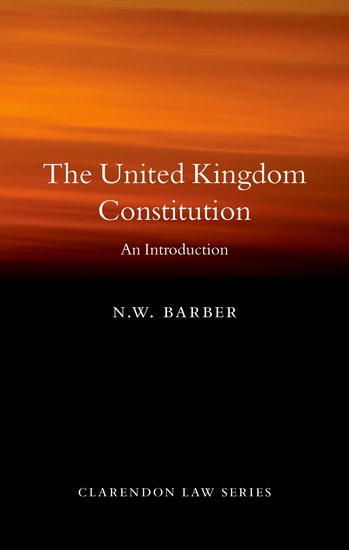Book Launch - The United Kingdom Constitution: An Introduction
Notes & Changes

'The United Kingdom Constitution: An Introduction' provides an account of the United Kingdom's constitution that recognises and embraces its historical, social, political, and legal dimensions. It critically examines the radical changes to the UK constitution that have occurred over the last thirty years, paying particular attention to the revival of the constituent territories of the UK - Wales, Scotland, Northern Ireland, and England - and to the increasing role played by the judges in constitutional disputes. The UK constitution is presented as being shaped by a set of constitutional principles, including state sovereignty, separation of powers, democracy, subsidiarity, and the rule of law: principles which set the overall structure of the constitution and inform statutes and the decisions of judges. Adopting a principled approach to the UK constitution allows us to see both the clarity of the constitution's structure and also helps explain its complexities.
Author

Prof Nick Barber (Fellow of Trinity College, University of Oxford)
Nick Barber joined the Oxford Law Faculty in 1998 as a Fixed Term Fellow at Brasenose, moving to a tenured Fellowship at Trinity College in 2000. He holds an MA from Oxford and the BCL, and is a non-practicing barrister and member of Middle Temple. In 2013 he was appointed University Lecturer in Constitutional Law and in 2017 he was appointed Professor of Constitutional Law and Theory. In 2012 and 2013 he was a visiting Professor at Renmin University, China. He has lectured extensively on constitutional law and theory in many countries. He has published many papers in these areas, and his book - The Constitutional State – was published in 2011, and has been widely reviewed. His second book, The Principles of Constitutionalism, was published by Oxford University Press in summer 2018. His most recent book, The United Kingdom Constitution: An Introduction will be published in the Clarendon Law Series in late 2021. He was founder editor of the United Kingdom Constitutional Law Blog, and he was a co-author, with Jeff King and Tom Hickman, of the blog post that sparked the litigation in Miller, a post which first advanced the arguments eventually adopted by the High Court and Supreme Court. Alongside Richard Ekins, he is co-director of The Programme for the Foundations of Law and Constitutional Government. He is currently Associate Dean (Research).
Panellists
Dr Hannah White is Deputy Director of the Institute for Government. She has strategic oversight of the Institute’s programme of work on government, parliament and the civil service, focusing on external relationships and impact. She has extensive knowledge of Westminster and Whitehall based on over a decade of experience in parliament and the civil service. Before running the Committee on Standards in Public Life in the Cabinet Office, she was a clerk in the House of Commons managing select and legislative committees and advising on parliamentary procedure. She received an OBE in the 2020 Birthday Honours for services to the Constitution. Hannah is a regular commentator for radio and television and has appeared on BBC1’s Andrew Marr Show, Radio 4’s Westminster Hour, World at One, the Today programme, Newsnight, BBC News and Sky News. She is a frequent contributor to the Institute’s comment pages and also writes for a range of media including The Guardian, The Times, The Telegraph and Prospect magazine.
Stephen Tierney is Professor of Constitutional Theory in the School of Law, University of Edinburgh and Visiting Professor and Distinguished Research Fellow at Notre Dame Law School. He is a Fellow of the Royal Society of Edinburgh, a member of the Judicial Appointments Board for Scotland and Legal Adviser to the House of Lords Constitution Committee. Professor Tierney is also member of the Executive Committee of the UK Constitutional Law Association and served as editor and then co-editor of the UK Constitutional Law blog from 2015-20: succeeding Professor Barber, the blog’s founding editor.
His research interests are in constitutional theory and United Kingdom and comparative constitutional law. He has published ten books including two monographs with Oxford University Press, with a further monograph, The Federal Contract, to be published by OUP in April 2022.
Michael Foran is a lecturer in public law at the University of Strathclyde. Prior to joining Strathclyde, he completed a PhD in Law at the University of Cambridge. His research focuses on constitutional theory and jurisprudence with a particular focus on common law theory and the natural law. His doctoral thesis explored the concept of equality before the law and its relationship to the rule of law within the common law constitutional tradition.
Signe Rehling Larsen is a Fellow by Examination in Law at Magdalen College. Before coming to Oxford, she was a Max Weber Fellow in Law at the European University Institute. Signe’s research is concerned with the study of constitutions in a theoretical, historical and comparative perspective. In her recent monograph, The Constitutional Theory of the Federation and the European Union (OUP 2021), Signe engages with the question of the constitutional nature of the European Union. The book demonstrates that the general assumption that the EU is unique, or sui generis, because it is neither a state nor an ordinary international organisation, is based on a flawed understanding of both history and constitutional theory. Signe is currently pursuing a new research project on empire and public law. By incorporating insights from history and social science on colonialism and imperialism, she aims to develop a public law theory of empire that can provide us with a better understanding of the legacies of imperialism in constitutional law, including its transnational dimensions.

